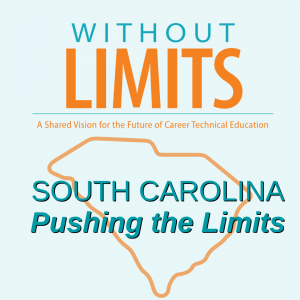Without Limits: A Shared Vision for the Future of Career Technical Education (CTE Without Limits) was released in March 2020 with the support of over 40 national organizations. In October 2021, Advance CTE launched a technical assistance opportunity called Advancing CTE Without Limits, which sought to support states in a project to coordinate systems, improve equity goals, strengthen policy or otherwise align with a CTE Without Limits principle. The year-long Advancing CTE Without Limits project ran from March 2022 to March 2023. This blog series shares the details, outcomes and lessons learned from projects across the three participating Pushing the Limits state teams – Colorado, Nebraska and South Carolina.
 Project Focus
Project Focus
South Carolina has made it a priority to build and create aligned state systems that can support all CTE learners to move seamlessly through their education and career journey. To accomplish this vision, South Carolina approached their Advancing CTE Without limits work through the lens of Principle 1: Each learner engages in a cohesive, flexible and responsive career preparation ecosystem.
South Carolina focused on three main objectives:
- Needs Assessment: Conduct a needs assessment to identify strengths and gaps within the state’s comprehensive local needs assessment (CLNA) process and outcomes (i.e., rural, middle school and students with disabilities).
- Guidance and Support for Local Implementation of Comprehensive Local Needs Assessment (CLNA): Provide strategic collaboration, peer learning, training and support to implement a more strategic process around CLNA.
- Building State Leader Data Literacy: Participate in professional development through Advance CTE’s Opportunity Gap Analysis to learn the root cause analysis process and get technical assistance to increase data literacy to address learner opportunity gaps.
Project Outcomes
Through monthly coaching and technical assistance provided by Advance CTE and Association for Career and Technical Education (ACTE) staff, South Carolina focused on evaluating its comprehensive local needs assessment process and outcomes with an emphasis on continuous improvement. Surveys were developed for state and local stakeholders to gather their input on both the implementation of the CLNA and the practical application of results of the CLNA process. Results of the survey showed that the CLNA process itself had been valuable, and it had served to strengthen connections across the career preparation ecosystem. However, at the state and local levels, stakeholders were not fully utilizing the information gleaned from the CLNA process. At the state level in particular, leaders from across agencies were not as engaged with each other around the CLNA results as the state desired.
This led the state CTE agency to start a quarterly interagency meeting to increase cross-sector team collaboration and support a high-quality career preparation ecosystem. To ensure sustainability of this strategic collaboration among their state agencies, South Carolina has put into practice a shared-ownership structure, where a different agency takes the lead in developing the shared agenda and leads the conversations. The first meeting included sharing results from the CLNA and the survey.
South Carolina also used the CLNA to inform the development of regional “snapshots” of data. The snapshots were published accompanied by a workshop and guidance to support the regional perspective being used in the state for the CLNA.
South Carolina has also designed differentiated support for the regions based on the needs assessment and survey of regions. These efforts have helped increase knowledge and staff capacity in the strategic use of data for the CLNA process.
The South Carolina team also participated in the Opportunity Gap Analysis workshop to learn to conduct root cause analysis, identify ways to address opportunity gaps for all learners and provide guidance to their local educators on how to build a comprehensive career preparation ecosystem.
Lessons Learned
One of the primary lessons learned through this project for South Carolina was to focus on making sure that the results of the CLNA are being used and not treated as a compliance exercise.
Recommendations
States are highly encouraged to look at CLNA results across all their eligible entities or regions and to identify common themes with a lens towards developing new policies, programs, technical assistance and professional development to help address the needs commonly identified across the state. In addition, states should make it common practice to provide technical assistance to local districts on how they can change their behaviors to better address needs.
Stay tuned for future updates about South Carolina’s continued efforts and for more information about other states’ Advancing CTE Without Limits projects. For more information about CTE Without Limits, visit https://careertech.org/without-limits.
To learn more about planning and implementing the principles of CTE Without Limits in your state, check out Pushing the Limits: A Roadmap for Advancing CTE Without Limits.
For more information on better using the CLNA to drive quality and equity within CTE systems and programs of study, read Lessons in Collaboration and Innovation: The Impact and Promise of the Comprehensive Local Needs Assessment.
Nithya Govindasamy, Senior Advisor
Alisha Hyslop, Senior Director of Public Policy, ACTE
